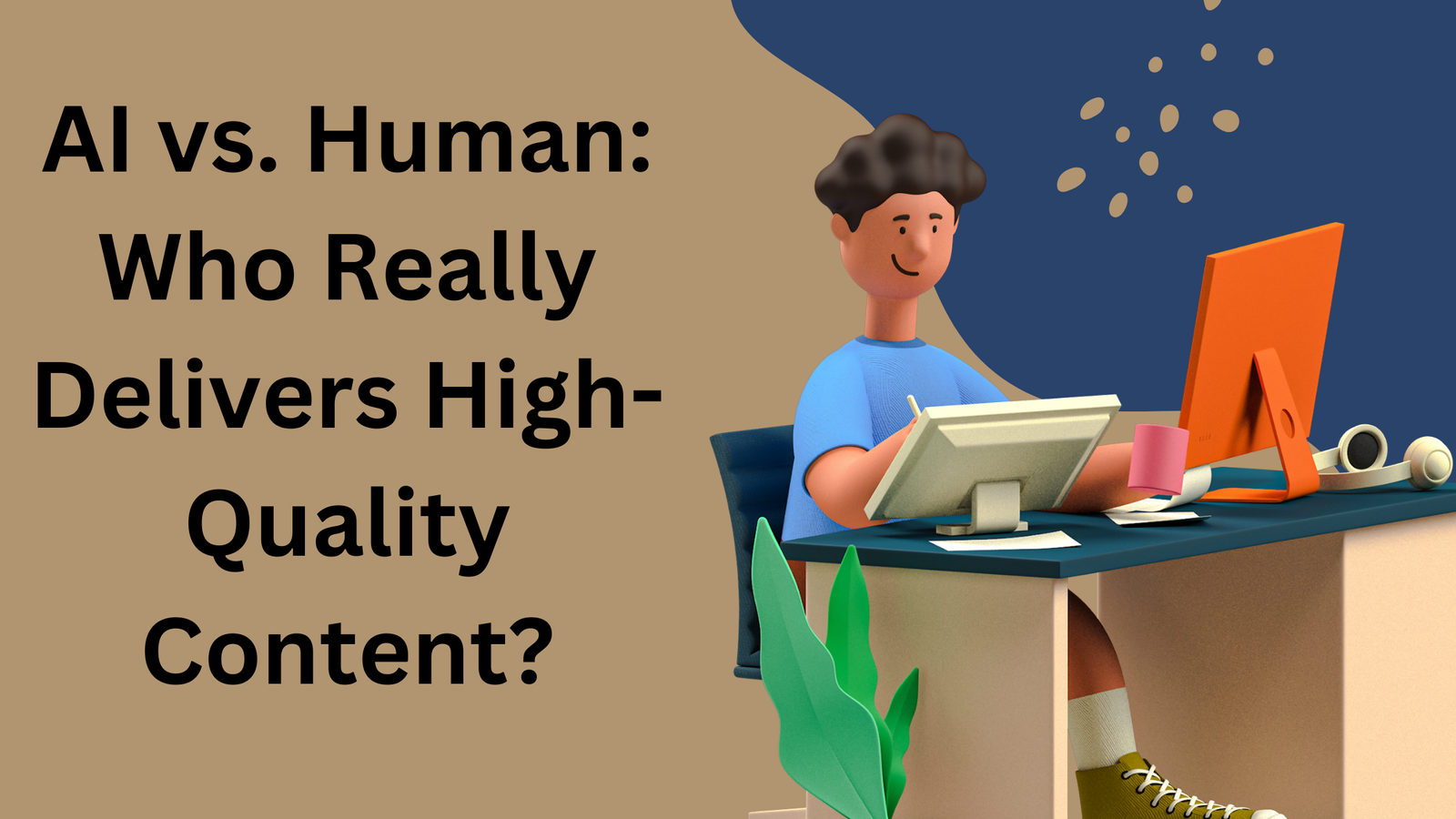AI vs. Human: Who Really Delivers High-Quality Content?
AI vs. Human: Who Writes High-Quality Content?

In today’s digital landscape, the importance of content quality has surged dramatically as businesses and creators strive to capture the attention of increasingly discerning audiences. With the proliferation of information available at our fingertips, the demand for engaging, informative, and well-crafted content has never been higher. This shift has coincided with the rise of artificial intelligence in content creation, sparking an ongoing debate about the effectiveness of AI-generated text compared to that produced by human writers.
Proponents of AI tout its ability to produce content quickly and efficiently, often at a lower cost, while critics argue that it lacks the nuance, creativity, and emotional resonance that only a human touch can provide. As these technologies evolve, many are left wondering: can AI truly replicate the depth and insight that human writers bring to their craft? This article aims to explore this intriguing comparison, delving into the unique strengths and limitations of both AI and human capabilities in producing high-quality content. By examining their respective roles in the content creation process, we hope to shed light on how businesses and individuals can leverage these tools to enhance their content strategies in a rapidly changing digital world.
What is AI Content Generation
AI content generation refers to the use of artificial intelligence technologies to automatically create written content, images, videos, and other forms of media. This innovative process leverages advanced algorithms and machine learning models to analyze vast amounts of data, learn from patterns, and produce high-quality content that mimics human creativity and writing styles. In practice, AI content generation can encompass a range of applications, from generating blog posts and marketing copy to creating personalized emails and social media content. Businesses and content creators find AI tools incredibly valuable, as they can significantly reduce the time and effort required to produce engaging material while maintaining consistency and relevance.
Furthermore, AI content generation can be tailored to specific audiences, enabling more targeted communication that resonates with readers. While it offers remarkable efficiency, the use of AI in content creation also raises questions about authenticity, originality, and the role of human creativity. Nevertheless, when used thoughtfully, AI content generation can enhance productivity and support creative processes, allowing writers and marketers to focus more on strategy and ideation rather than the mechanical aspects of content creation. Ultimately, it represents a powerful intersection of technology and creativity that is reshaping how we produce and consume content today.
The Human Touch in Writing
The human touch in writing is what distinguishes engaging content from the mundane, transforming words on a page into a vibrant conversation. It’s that unique ability to infuse personality, emotion, and authenticity into your writing, creating a connection that resonates with readers. Whether it’s through relatable anecdotes, vivid imagery, or a conversational tone, the human element invites readers to feel something—a spark of joy, empathy, or curiosity. This connection is especially crucial in an era dominated by digital communication, where automated responses and formulaic content can often feel cold and impersonal. By weaving in personal stories or candid reflections, writers can cultivate a sense of intimacy, making the audience feel as if they are sharing a moment with a friend rather than reading a detached report.
Moreover, incorporating humor, vulnerability, and genuine enthusiasm into your writing can turn a simple message into an engaging narrative that sticks with the reader long after they’ve finished reading. Ultimately, embracing the human touch in writing not only enriches the content but also fosters loyalty and trust among readers, encouraging them to return for more and engage in a meaningful dialogue. It’s this authenticity that breathes life into words and leaves a lasting impact.
Comparing Quality: AI vs. Human Content
When it comes to comparing the quality of AI-generated content versus human-created content, the conversation often revolves around creativity, nuance, and emotional depth. AI, with its advanced algorithms, can churn out articles, reports, and social media posts at lightning speed, making it a powerful tool for generating large volumes of text. However, while AI excels in data processing and can produce grammatically correct and coherent content, it often lacks the human touch that brings authenticity and emotion to writing. Human writers possess the ability to infuse their work with personal experiences, cultural references, and a unique voice that resonates with readers on a deeper level.
They can engage in storytelling, provide insights based on empathy, and adapt their writing style to fit various audiences. Additionally, human content creators are better equipped to handle complex subjects that require critical thinking and creativity, as they can draw upon their lived experiences and emotional intelligence. Ultimately, while AI can serve as a valuable asset in content production, it cannot fully replace the richness and depth that human writers bring to the table, making a hybrid approach that leverages both AI efficiency and human creativity an ideal solution for many content needs.
The Role of AI as a Writing Assistant
The role of AI as a writing assistant has become increasingly significant in today’s digital landscape, revolutionizing the way we approach content creation. Unlike traditional writing tools, AI-driven assistants offer personalized support, helping writers streamline their creative processes and enhance their productivity. By analyzing user input, AI can suggest relevant topics, generate outlines, and even craft entire paragraphs, allowing writers to overcome blocks and explore new ideas. This technology adapts to individual writing styles, offering tailored feedback and improving clarity, coherence, and engagement in the text.
Moreover, AI writing assistants can assist with grammar checks, plagiarism detection, and formatting, ensuring that the final product is polished and professional. They serve as a collaborative partner, enabling writers to focus on the essence of their message while handling the more tedious aspects of writing. For students, professionals, and casual writers alike, AI tools democratize access to quality writing support, making it easier to express thoughts and share stories. As this technology continues to evolve, it promises not only to enhance writing efficiency but also to foster creativity, providing a valuable resource in our increasingly content-driven world. Embracing AI as a writing assistant is not just a trend; it’s a forward-thinking approach to effective communication.
The Future of Content Creation: Trends and Predictions
The future of content creation is set to undergo remarkable transformations driven by technological advancements and shifting audience preferences. As artificial intelligence and machine learning become more sophisticated, we can expect a surge in AI-generated content, which will streamline the production process while enhancing personalization. Creators will harness AI tools to analyze audience behavior and tailor content that resonates more deeply, fostering stronger connections. Additionally, video content will continue to dominate, with short-form platforms like TikTok and Instagram Reels leading the charge, compelling creators to adapt quickly and creatively to engage viewers in a crowded digital landscape.
Interactive content, such as quizzes, polls, and immersive experiences using augmented and virtual reality, will also gain traction, providing audiences with more engaging and participatory ways to consume content. Moreover, as sustainability becomes a core concern for consumers, brands will increasingly prioritize ethical storytelling and transparency, reflecting their values in the content they produce. Collaborations between creators across diverse fields will further enrich the content landscape, blending expertise and creativity. Overall, the future of content creation promises to be dynamic and collaborative, with an emphasis on authenticity and audience engagement driving innovative approaches. Embracing these trends will be essential for creators aiming to thrive in this evolving environment.
How do human writers contribute uniquely to content?
Human writers bring an unparalleled depth of creativity, empathy, and contextual understanding to content creation that machines simply cannot replicate. Unlike algorithms, which rely on patterns and data, human writers infuse their work with personal experiences and emotional resonance, enabling them to craft narratives that truly connect with readers. This ability to understand and interpret complex human emotions allows writers to tailor their content to various audiences, ensuring that the message not only resonates but also engages and inspires.
Additionally, human writers possess the unique capacity for nuanced expression, enabling them to convey subtlety and irony in their writing, which often enriches the reader's experience. They can adapt their tone, style, and voice to suit different mediums—whether it's a heartfelt blog post, a persuasive marketing piece, or a captivating story—while considering cultural and societal contexts that shape communication. Moreover, human writers can think critically and creatively, offering innovative ideas and perspectives that machines may overlook. Ultimately, it's this blend of creativity, emotional intelligence, and critical thinking that empowers human writers to produce content that is not just informative but also meaningful and impactful, fostering genuine connections with readers and enriching the overall discourse.


.png)



